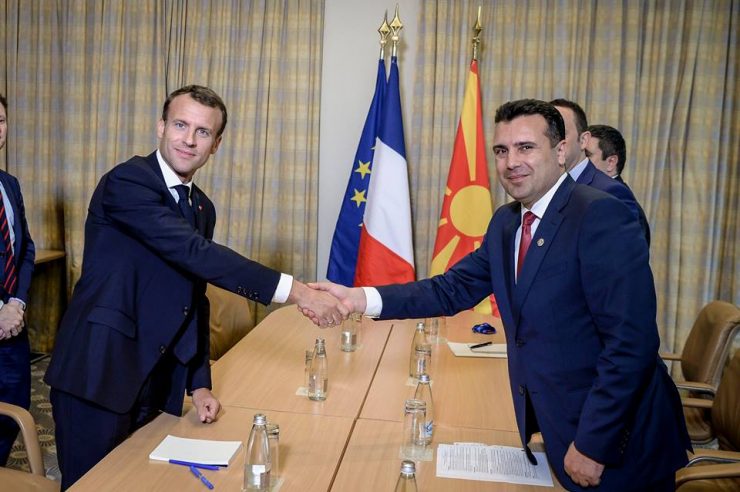“Macron says ‘no’, and one government in the Balkans is already falling apart: If Europe needed proof that it still had political influence in the world, it could find it in Skopje right now,” German newspaper Frankfurter Allgemeine Zeitung (FAZ) commented, Deutsche Welle reports.
After French President Emmanuel Macron blocked the start of EU accession negotiations with North Macedonia and Albania at the EU summit last week, it took only 48 hours for the government in N. Macedonia to announce its immediate end.
The author of the analysis also referred to the future, and the fate, of the Prespa Agreement. Explaining that ethnic Macedonians are still resenting the name change, FAZ writes that the results of the early elections could affect the Agreement and relations with Greece.
In the main opposition VMRO-DPMNE party, which lobbies between nationalism, populism and patriotism, you will not find a politician who openly questions the EU as the ultimate goal. (…) The party is strongly opposed to the name change but continues to insist on EU membership. To date there is no unambiguous statement about something different from the head of VMRO, Hristijan Mickoski. But if you look in more detail, things look different, FAZ notes. “A state called North Macedonia does not exist in the political rhetoric of VMRO – or if it exists, then only as an offensive word. Mickoski and his colleagues only talk about Macedonia. Even party posters or banners only recognize the old state name. Antonio Milososki, a leading VMRO politician and Macedonian foreign minister from 2006 to 2011, sums up his party’s stance: ‘Our citizens call their country Macedonia and will continue to call it what they are historically accustomed to and in accordance with their right to freedom of expression. Imposed solutions will not change the will of the people,” FAZ writes.
Guarantee of deteriorated relations with Athens
If VMRO succeeds in assuming power after the April elections, this stance would be a guarantee of deteriorating relations with Greece,” the paper said, explaining that the Prespa Agreement, although signed, has not yet been fully implemented.
As an example, the GAZ author also cites trademarks that need to be adapted to the new terminology. In particular, Macedonian wine, which Greek and Macedonian winemakers insist they have the right to sell as “Macedonian”.
A VMRO-led government can hardly be expected to push for such and other details of the deal, which it rejects anyway. That, in turn, will provoke a backlash from Greek Prime Minister Kyriakos Mitsotakis… who has already said he would not sign the Prespa Agreement but will respect it. (…) In any case, a prime minister in Skopje who would consequently use the old state name would cause a reaction in Athens, FAZ notes.
It will be problem for VMRO-DPMNE, the German paper goes on to say, to find a coalition partner.
However, it is far from certain that there will be a change of government in North Macedonia. Because even if VMRO again becomes the strongest party, the question remains where to find a coalition partner. It will be interesting to see the first opinion polls after Macron’s “No”. The current Prime Minister Zaev presents himself as optimistic. He believes that citizens will make a ‘wise decision’ on April 12, Frankfurter Allgemeine Zeitung writes.




Comments are closed for this post.